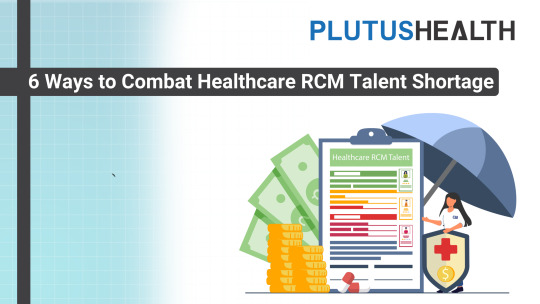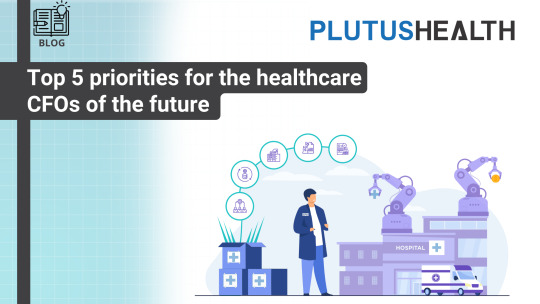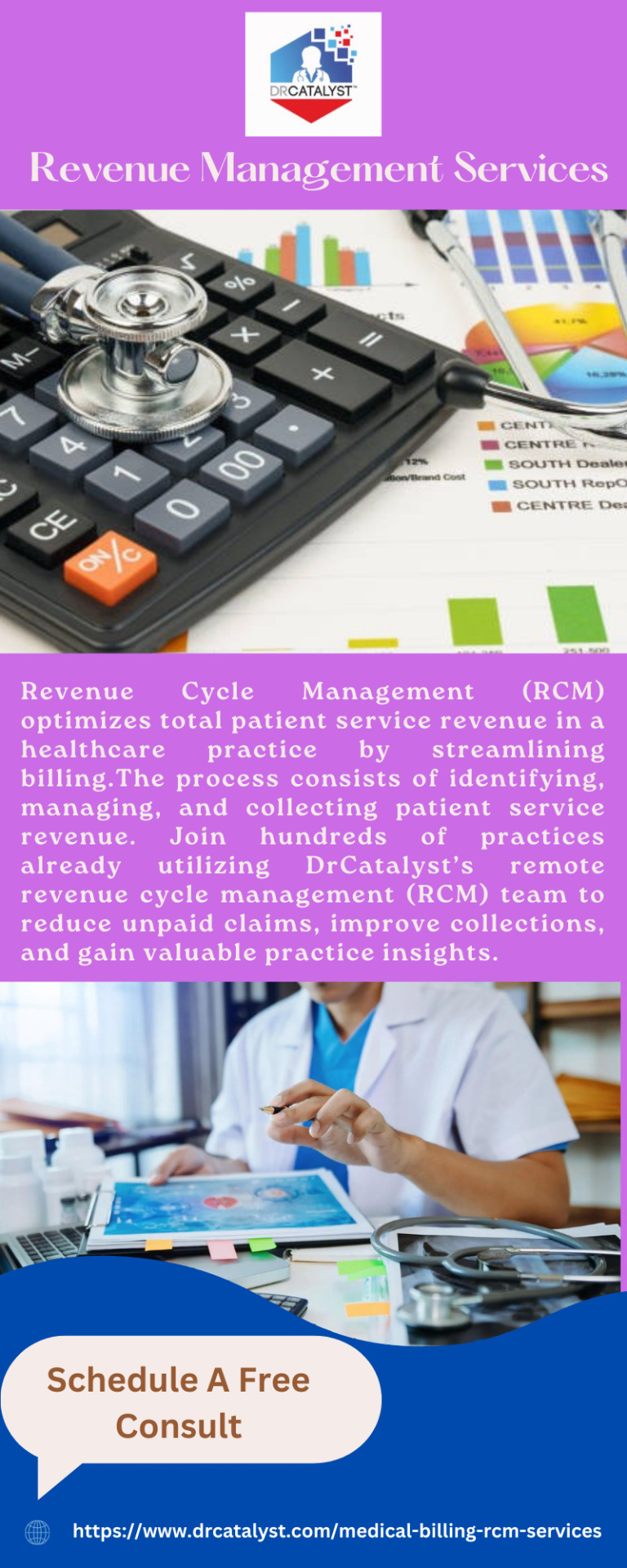#revenue cycle management solution
Text
6 Ways to Combat Healthcare RCM Talent Shortage

Hospitals encountered billions of dollars in loss due to the healthcare skill shortage in 2022, and this upset would grow in the forthcoming years. RCM (Revenue cycle management) is primarily pendant on the workforce. The efficiency and productivity of a provider's income rely on how well the staff can address their medical billing and coding. RCM requires timely follow-ups, processing documentation, and handling denials. The ineptitude to perform the above processes leads to cash flow insufficiencies, expanded contradictions, mistakes, and reduced productivity.
The healthcare enterprise will be transient by over 122,000 by 2032, foresaw AAMC (Associates of Medical College). Skill shortage would affect caregivers, the supporting RCM professionals, and administrative staff. The labor expense would grow by $86 billion in the forthcoming year, while the other costs would increase by $49 billion.
Are you ready to fight the impending talent deficiency in the healthcare industry? Are you also encountering a revenue cycle skill shortage? After profoundly researching why there is a resource crunch in healthcare revenue cycle management, professionals specially hand out the article. We have also discussed the steps to overcome the healthcare revenue cycle skill shortage.
Ways to overpower Healthcare RCM Talent Shortage
Healthcare providers reduced patient retention in 2022 due to recurring resignations and earlier retirement. Here are the top methods to overcome the healthcare RCM talent deficiency.
Utilize cloud
Employee automation
Adequate operational framework
Enhance strategies
Make endurable transformation
Believe in outsourcing
Why is the healthcare sector encountering an RCM resource crunch?
After the Covid-19 pandemic smashed the globe, the healthcare sector is working better than its ability to provide care to consumers. Many caregivers chose to retire early or change to a distinct organization. Even the supportive and back-office staff left the association. Here are additional reasons for the resource crunch:
Earlier retirement
Workload
Low income
Higher growth option
Employees changing, retiring, or leaving their jobs leads to a resource crunch, a tremendous loss for the healthcare provider. Below are the methods to overwhelm the healthcare RCM talent shortage and expand your practice.
Utilize cloud
Cloud-based RCM software aids healthcare providers in performing tricky tasks remotely without needing more resources. Cloud-based EMR software forms a virtual infrastructure that lets healthcare providers access documents anytime, anywhere, without compromising safety.
Employee automation
Technologies like AI (artificial intelligence), RPA (robotic process automation), and ML (machine learning) aid healthcare providers in dealing with RCM staff need efficiently. You can accomplish all the process deadlines without hindering the process quality. Automation eradicates all redundant tasks decreasing the need for FTEs.
Healthcare providers can also facilitate numerous labor-intensive RCM tasks with the optimum utilization of technology. The intro of patient portals allows practices to keep patient finances with a simple click, undervaluing the cost of patient registration, sending patient statements, taking patient follow-up, and collecting payments.
Adequate operational framework
It is tough to keep and control the operating framework in the healthcare RCM due to the increased volume of processes and accuracy requirements. Healthcare providers must create a streamlined work procedure that lets the staff comprehend their work without handling the burden. Healthcare practices can investigate the productivity of each employee and prepare the team based on the information.
Enhanced strategies
Work techniques play a crucial role in healthcare revenue cycle management as all the functions are interdependent. Enhanced plans permit healthcare providers to battle unanticipated staff shortages without hindering operations. Devising work strategies can aid healthcare providers in preparing for impulsive registration.
Make endurable transformation
Denial trend analysis is vital for healthcare providers to run a profitable business. Knowing the root cause of denials aid healthcare providers in making the typical errors hampering revenue. It also boosts the billing staff to work more efficiently, as most of their claims bring revenue.
Believe in outsourcing
Outsourcing is an essential option for healthcare providers to fight the healthcare RCM talent shortage. Outsourcing RCM services boosts the productivity of healthcare providers at minimum cost. A Healthcare provider's RCM gets handled by trained professionals with experience and certification in the tasks assigned to them. RCM service providers efficiently manage account receivables and denials, increasing the FPAR for the healthcare provider.
RCM service providers use an excellent mix of technology and experience to offer superior results for healthcare practices. Besides revenue management, organizations can achieve patient and practice management benefits without constructing additional IT infrastructure.
Ways to choose the right revenue cycle management service provider
Keeping a fast and healthy cash flow is paramount for healthcare providers to stay strong in the market. Revenue authorities should handle all the pain points of healthcare providers and stop them from deficits and revenue leakage.
It is vital to select the correct revenue cycle service vendor. Healthcare providers' RCM process depends on the company they partner with. The right enterprise aligns with your objectives and provides answers that guarantee results.
You must partner with the RCM enterprise open to funding in the latest trends and technology. Plutus Health has the best resolutions for your practice to sustain and facilitate your revenue. We are a one-stop resolution for all your RCM needs.
Our trained professionals provide all the RCM services. They should be capable of giving outcomes without compromising grades. Schedule a call with our professionals to facilitate your revenue cycle management strategies.
#revenue cycle management healthcare#revenue cycle management in medical billing#revenue cycle management consulting#revenue cycle management solution#revenue cycle management process#revenue cycle management in healthcare
0 notes
Text
AVOID 10 COMMON MEDICAL BILLING ERRORS

Medical billing errors are periodic statements or reflections of an extension of credit not made to a person or consumer who has implied, actual or apparent authority to use a credit card or open-end credit plan. It happens when healthcare professionals bill patients for services they have not received or incorrect services. Medical billing error also occurs when scheduled services of patients are included in the billing and later canceled. These errors also included misapplied payments, billing error calculations, statement errors, or unrecognized statement changes. As a result, medical professionals have to face denial claims, delayed payments, and some, it turns out, in the form of substantial financial loss. The article will discuss 10 common errors in medical billing to help you avoid all hazards that happen in medical billing. Following are the common errors to watch out for. Read More…
For further details and daily updates, Follow us on LinkedIn or Visit.
#medical billing outsourcing#medical billing service companies#healthcare#medical billing solutions#hospital#medical billing florida#physician#cardiology#revenue cycle management
2 notes
·
View notes
Text
Choose Avetalive for Revenue Cycle Management Services in NYC
Are you wondering whether you should take Revenue Cycle Management Services or not? Taking help from professionals can help you maximize cash flow by optimizing the workflow and faster collection process. If you are interested, you can contact us or visit https://avetalive.com/
2 notes
·
View notes
Text









#financial transformation#medical groups#financial services#telecommunication utility service#customer experience solutions#physician staffing#business process outsourcing#revenue cycle management#diagnostic labs service
2 notes
·
View notes
Text
The Comprehensive Guide to Revenue Cycle Management in Healthcare
A Comprehensive Approach to Revenue Cycle Management for Enhancing Healthcare Finances.

Source: freepik.com
Revenue cycle management software is useful to speed up and improve financial operations in healthcare organizations faster, including patient registration, appointment scheduling, payment processing, and revenue collection.
The purpose of healthcare Revenue cycle management software automation is to increase the efficiency, accuracy, and overall effectiveness of financial management in healthcare services.
Revenue cycle management is the financial process used by healthcare organizations to track patient care phases from registration and scheduling appointments to the final payment of balances. Revenue cycle management software is accomplished by the use of medical billing software.
Revenue cycle management software in healthcare connects the commercial and clinical sides of the industry by connecting official statistics, such as a patient’s identity, insurance provider, and other personal data, to the treatment they are getting and their healthcare information.
In this blog, advanced Revenue cycle management technologies and best practices are described.

Source: freepik.com
What does Revenue Cycle Management entail in healthcare?
Revenue Cycle Management (RCM) is the delicate balance between providing treatment and ensuring financial viability in healthcare.
It handles everything from initial patient scheduling and insurance verification to claim filing, payment collection, and even the management of outstanding amounts.
Revenue Cycle Management specialists verify that accurate coding represents the services given, help clients manage the complexity of insurance plans, and correct any claim denials.
RCM assists healthcare providers in maximizing revenue collection and maintaining a strong financial pulse, allowing them to focus on what matters most: quality patient care.
Why is RCM vital for healthcare practices?
For healthcare providers Revenue Cycle Management is critical because it provides efficient billing, quick reimbursement, and financial stability, allowing them to provide great patient care while being operationally relevant.
1. Financial stability
Revenue Cycle Management helps healthcare organizations efficiently handle their finances and ensures that they are compensated for services provided in a timely and accurate way. It helps to keep the organization’s finances stable.
2. Improved patient experience
Revenue Cycle Management reduces confusion and annoyance for patients by streamlining the billing and payment processes, resulting in a better overall experience.
3. Compliance with regulations
Revenue Cycle Management makes it possible for healthcare facilities to keep up with billing and reimbursement regulations including HIPAA and the Affordable Care Act.
4. Operational Efficiency
A well-managed revenue cycle management procedure improves the operational efficiency of a healthcare organization. It lowers administrative expenses so that medical professionals and employees may focus on patient care rather than accounts payable and receivable issues.
5. Adaptability to Market Changes
The healthcare industry continually evolves as a result of new treatments, technology, and legal adjustments.
Whether you’re incorporating new billing codes, adjusting to changes in insurance policies, or introducing new payment models like value-based healthcare, a robust revenue cycle management system provides you the flexibility to react to these changes.

Source: freepik.com
Key Features of Effective RCM
The critical components of effective revenue cycle management, include:
1. Patient Registration
The initial stage in the revenue cycle management process is to register patients. It entails gathering patient demographic and insurance information to verify coverage and file claims. To avoid claim denials and rework, patient registration must be accurate.
A strong patient registration procedure is essential for gathering all relevant information and ensuring data correctness.
2. Insurance Verification
Insurance verification involves determining the patient’s insurance coverage and benefits. Verifying insurance information before providing services is critical for avoiding claim denials and rework.
Insurance verification includes checking the patient’s coverage, payments, deductibles, and coinsurance. Accurate insurance verification allows healthcare organizations to bill the correct amount while avoiding claim denials.
3. Claims Submission
Claims submission refers to filing claims to an insurance company for compensation. Claims must be accurate and comprehensive to avoid denials and rework. Claims submission involves coding, billing, and submitting claims electronically or on paper.
Electronic claim submission is quicker and more efficient than traditional paper claim submission. It is critical to have a reliable claims filing procedure that assures accuracy and completion.
4. Denial Management
Denial management refers to the process of managing claim denials and rework. Denials can arise for a variety of reasons, including incorrect data, missing information, or faulty coding.
Denial management entails determining the root reason for the denial, fixing the problem, and resubmitting the claim. It is critical to have a strong denial management strategy that decreases claim denials and rework while increasing income.
5. Collections
Collections refer to the process of collecting money from patients and insurance companies. A strong collections strategy is vital for ensuring timely payments and reducing bad debts.
Collection activities include providing statements to patients, following up on overdue accounts, and appealing disallowed claims. A strong collection procedure helps healthcare organizations enhance their cash flow and financial performance.
Conclusion
By following these guidelines and noticing the significance of revenue cycle management, healthcare professionals may improve their financial health and ensure the long-term viability of their practice.
Remember that revenue cycle management is an ongoing process that needs regular monitoring and improvement. By allocating time and resources to RCM, you may position your practice for financial stability and development.
#Revenue Cycle Management#Revenue Cycle Solutions#Revenue Cycle Services#Revenue Cycle#Revenue Cycle Strategies
0 notes
Text
Stay Ahead in the Financial Game with Katpro's RCM Solutions
Lead the competition and secure your financial success with Katpro Technologies' dynamic Revenue Cycle Management Solutions. Harness the power of advanced analytics and automation to optimize revenue cycles and drive sustainable growth. With Katpro's expertise, navigate the complexities of financial management with confidence and ease.

0 notes
Text
#Medical billing services in kansas#Revenue cycle management in kansas#Medical practice management in kansas#Healthcare software development in kansas#Healthcare compliance solutions in kansas
1 note
·
View note
Text

#Dental Medical Billing#Best Dental Billing Services in USA#Dental Billing Services#Dental Billing Services in US#Dental Revenue Cycle Management#Dental Billing Specialist#Dental claims management#Dental practice revenue#Dental revenue cycle solutions#Outsourced Dental Billing Services
0 notes
Text
#rannsolve#usa#texas#rannsolveinc#healthcare solutions#healthcare revenue cycle#healthcare services#denial management#healthcare#ing#Healthcare RCM Services#RCM Healthcare Services#Healthcare RCM Companies
0 notes
Text
Top 5 priorities for the healthcare CFOs of the future

Medical technologies that can efficiently complete activities that formerly required innovators have developed numerous people. Automation offers healthcare RCM services that run rampant in most sectors. Despite this development, hospital CFOs have not implemented systems that would streamline certain operations.
Here are the healthcare RCM services priorities hospital CFOs need to target.
Staff Training
Most medical AI solutions used in healthcare RCM services are created to support employees rather than replace them. These programs can harm an organization's success if misapplied. Even though some systems function well without human intervention, many still depend on staff supervision.
Automation promotes small, highly skilled workforces. Thus procedures can contribute to developing a top-tier workforce. Competent suppliers will use machine/human interactions to increase the productivity of their staff.
Automatic Updates
RCM billing services' medical billers frequently have to deal with quickly evolving payer and regulatory standards. While some practices immediately receive regulation updates, RCM services in the healthcare industry continue to update standards slowly. These changes frequently prevent the submission of claims by imposing legal limitations or making a denial likely.
Automated processes update internal worker manuals by swapping outdated information for recently approved information. Staff members are kept up to date on any new or changing requirements thanks to these consistent, brief notifications. A clinic-wide network application will be accepted.
Clinical Documentation Improvement
Miscommunications between the patient, clinician, biller, and payer are less common because of clinical documentation improvement (CDI). RCM billing services for patient data on EHRs use CDI software reviews. The RCM outsourcing businesses notify users of any necessary adjustments in circumstances where this data is insufficiently detailed.
Other software enhances the record-keeping for doctors. Clinicians are prompted to record information about services and patients through CDI initiatives. This monitoring ensures that the person knows the necessity to produce claims that can be approved. To entirely or significantly reduce denials, coders can dependably use physician notes to accurately provide the service or operation.
Claim Denial Tracking
If a payer denies several claims in a short period, the denials are probably due to the same reasons. The majority of insurers will explain each denial in detail. Reissuing a payment request, however, takes time and runs the risk of missing a submission deadline.
Before being sent to the payer, AI systems can identify claim problems, assisting with revenue cycle management for medical billing. These programs will either draw attention to issues for human adjustment or directly address them. Corrections made in advance save time and work in the billing process.
Claim Denial Analysis
Providers must invest in redesigning problematic areas of their workflow after spotting a denial trend. Analytics-based data-driven platforms can create the road map for this transformation.
Analytics will show what errors happen most often and under what conditions. This data, when used in conjunction with internal audits, can radically change a procedure. By focusing on specific areas that require modification, auditors can cut out pointless reviews.
Plutus Health provides RCM billing services to end this struggle by offering high-quality, contemporary RCM automation at a reasonable cost. To support our skilled billing team, we offer the highest-end, most advanced healthcare RCM service technology and automated software. Get in touch with us right away to benefit from our hybrid model and avoid technology chasing.
Key Takeaways
1. Staff are still an essential part of technical development.
2. Quickly updated automated systems change billing policies.
3. CDI software lessens misunderstandings.
4. Before submitting a claim, systems find flaws.
5. Data evaluation healthcare RCM services denials are categorized by AI for examination.
#revenue cycle management solution#revenue cycle management in medical billing#healthcare revenue cycle management solutions#revenue cycle process in healthcare
0 notes
Text
Boost Your Bottom Line: 5 Essential Steps to Enhance Revenue Cycle Management

Contents
1. Introduction:
2.1. Patient eligibility verification and registration
2.2. Improve strategies for Revenue Cycle Management
2.3. Optimization of coding documentation
2.4. Reimbursement and collection of revenue
2.5. Implementation of performance metrics and data analytics
3.Conclusion
Introduction:
Financial performance and any organization can be boosted only through revenue cycle management (RCM). It is a process of managing the financial aspects of an organization linked with clinical and administrative functions. Financial cycle management involves patient eligibility verification, patient registration, claim submission, reimbursement and collection through utilizing medical billing software. Healthcare organizations use Revenue Cycle Management to track the episodes of patient care from registration, appointment, and scheduling, final payment and revenue generation. The goal of revenue cycle management in medical billing is to enhance revenue generation, reduce the risk of financial losses, improve cash flow and stay in operation to treat the patients. Following five essential steps to boost the bottom line to enhance effective revenue cycle management are as following. Read More...
For further details and daily updates please follow us on LinkedIn or visit Ensure MBS
#medical billing outsourcing#ar#ar management#medical billing service companies#healthcare#medical billing solutions#hospital#physician#medical billing florida#revenue cycle management#revenue cycle outsourcing
2 notes
·
View notes
Text

Revenue Management optimizes total patient service revenue in a healthcare practice by streamlining billing. To get the best revenue management services contact DrCatalyst. Our RCM includes Demographic and Charge Entry, Claim Review & Scrubbing, Electronic & Paper Claim Submission, Clearinghouse Rejection Corrections, Patient Statement Generation, and many more. For more information visit our website.
0 notes
Text
Enhancing Workplace Efficiency through Effective Communication and Remote Staffing

Effective communication is crucial in the workplace. Focus on clear verbal and written messages and ensure active listening. Virtual staffing workspaces and remote staffing can significantly enhance efficiency and productivity.
#backoffice#remote staffing company#callcenteroutsourcing#outsourcing#remote staffing#virtual staffing#virtual staffing company#revenue cycle management#infomaticsolutions#remote staffing solutions
0 notes
Text
Elevate Your Financial Performance with Revenue Cycle Management Solutions
Achieve unparalleled financial efficiency and performance with Katpro Technologies' revenue cycle management solutions. Our comprehensive suite of services empowers businesses to optimize revenue streams, minimize revenue leakage, and improve overall financial health. Partner with us to unlock new revenue opportunities and drive sustainable growth.

0 notes
Text
Medical Billing Services | Revenue Cycle Management Solutions
Viaante provides a wide range of Medical Billing Services & Revenue Cycle Management Solutions to Hospitals. We leverage people, processes, and technology to provide operational and financial solutions to our clients. Our goal is to help you maximize reimbursement while reducing the overall cost of RCM. Our services include Medical Coding, Charge Capture, Payment Posting, and Accounts Receivable Follow-Up. These can be provided on a standalone basis or under our complete RCM offering.
Viaante delivers to hospitals an end-to-end solution which can yield a definite increase in operating margin, not just improved account receivables. Our end-to-ended back-office and knowledge processing solutions have increased the productivity and profit margins of our clients. This, in turn, has helped our clients to bridge the capital investment gap for upgrading existing healthcare services India and it has also given them margins to address new challenges in the healthcare industry.
0 notes